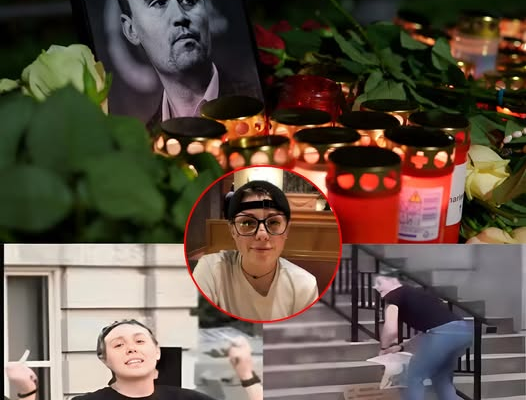OUTRAGE IN ARKANSAS: Kerri Rollo’s Fall From Activist to Outcast After Destroying Charlie Kirk Memorial

Bentonville, Arkansas — What began as a late-night act of political defiance has spiraled into a personal catastrophe for 34-year-old Kerri Rollo, a self-described progressive activist who admitted to vandalizing a memorial to the late conservative firebrand Charlie Kirk outside the Bentonville courthouse.
The fallout has been swift and merciless: she has lost her job, been served with an eviction notice, and, in a stunning reversal of fortune, has turned to crowdfunding platforms, begging strangers online for financial support.
The Incident That Sparked It All
Onlookers described the scene as “brazen and shocking.” In the days after Charlie Kirk’s assassination stunned his supporters nationwide, local residents had placed candles, flowers, and flags in front of the courthouse in Bentonville — a quiet space meant for reflection.
Witnesses say Rollo stormed the display, toppling candles, scattering flowers, and stomping on a framed photo of Kirk while shouting:
“This is a shrine to hate — and I won’t let it stand here!”
Videos recorded by passersby spread like wildfire across social media. Within hours, hashtags like #KerriRollo and #DisrespectInBentonville were trending nationwide.
Backlash and Arrest
Police arrived at the scene minutes later. Though Rollo was not arrested on the spot, charges of vandalism and disturbing the peace were later filed. Local authorities said the case would proceed to court in the coming weeks.
The symbolism of the act — striking at a memorial rather than engaging in debate — drew sharp condemnation, even from some who admitted they disagreed with Kirk’s politics.
Losing Her Job
By the following morning, Rollo’s employer, a regional marketing firm, announced her termination. In a brief statement, the company said:
“Our values are rooted in respect, professionalism, and community. We cannot condone or be associated with such behavior.”
Former colleagues described the office atmosphere as tense, with some employees fearing their own reputations might be tainted by association.
Eviction Notice
Days later, the fallout deepened. Rollo’s landlord, citing “violations of lease agreements” and “concerns for property safety,” served her with an eviction notice.
Neighbors had begun protesting outside the property, leaving notes condemning her actions. Others said they feared retaliation or unwanted media attention from the viral scandal.
Begging Online

Now homeless and jobless, Rollo has launched a GoFundMe campaign, framing herself as a “political prisoner of cancel culture.” In her plea, she writes:
“I stood up against fascism and white supremacy, and now I’ve lost everything. Please help me survive. I don’t regret speaking the truth.”
But online donations have been sparse. While some progressive allies offered small contributions, the majority of comments under the campaign were hostile, mocking her downfall or accusing her of hypocrisy.
Public Reaction
The story has ignited fierce national debate.
- Supporters of Kirk: “Actions have consequences. She disrespected a man’s memorial. This is justice,” wrote one Facebook user.
- Critics of the backlash: “Evicting someone is extreme. Losing a job is one thing, but pushing someone into homelessness is cruel,” tweeted a progressive activist.
- Cultural analysts: “This is another case of viral outrage collapsing someone’s life overnight. But was the punishment proportionate?”
Families Speak Out

Perhaps the most emotional reaction came from a Bentonville mother who had brought her children to the courthouse memorial the same day it was destroyed:
“We came to light candles and teach our kids about respect. What they saw instead was rage and destruction. How do you explain that to children?”
What Comes Next
Rollo’s court date is scheduled for next month. If convicted, she faces fines and possible community service. But the larger question remains: can she rebuild her life after being cast out by her community and vilified online?
For now, she lives in temporary housing, writing long social media posts defending her actions while asking for donations. Her GoFundMe campaign, however, has raised less than $500 — far short of her $20,000 target.
Conclusion
In the end, Kerri Rollo’s story is less about one woman and more about the clash of politics, grief, and the internet age.
By vandalizing a memorial, she turned personal conviction into public outrage. By doubling down online, she invited both scorn and sympathy. And by losing her job and her home, she became another example of how quickly life can unravel in the viral spotlight.
Whether she is remembered as a reckless vandal or a martyr of free speech will depend on which side of America’s cultural divide you ask.
JIMMY KIMMEL EXPLODES: “Two Stadiums, 300,000 People — America Has Lost Its Mind About Charlie Kirk!” More than 300,000 people filled two stadiums to pay their respects, turning the ceremony into a national event. But Jimmy Kimmel fired back, calling it wasteful and dangerous. His harsh words raised a chilling question…
JIMMY KIMMEL EXPLODES: “Two Stadiums, 300,000 People — America Has Lost Its Mind About Charlie Kirk!”
It was supposed to be a solemn day of remembrance, but instead it became one of the most polarizing cultural flashpoints of the decade.

More than 300,000 people packed into two stadiums — one in Phoenix, Arizona, and another in Dallas, Texas — connected by live feeds, giant LED screens, and deafening chants. The event was billed simply as “A National Farewell.” But the scale of the turnout was unlike anything seen in recent political memory.
Rows of American flags waved in unison, choirs sang patriotic hymns, and giant portraits of Charlie Kirk glowed under the stadium lights. In Dallas, drones painted the sky with his initials; in Phoenix, veterans stood at attention as taps played. It felt less like a memorial and more like a coronation.
And yet, just hours after the ceremonies concluded, Jimmy Kimmel detonated the calm.
Kimmel’s Furious Words
On his personal livestream — since ABC’s suspension had silenced his late-night show — Jimmy Kimmel delivered a blistering tirade that ricocheted across the internet.
“Two stadiums, 300,000 people,” Kimmel exclaimed, his voice rising. “America has lost its mind about Charlie Kirk! This isn’t mourning — this is madness. It’s wasteful, dangerous, and it turns grief into a circus. What are we even honoring here?”
The words landed like a hammer. Supporters of Kirk erupted in rage, accusing Kimmel of desecrating a moment of national unity. But others quietly admitted they had wondered the same thing: how had one man’s passing become such a spectacle, consuming two stadiums, millions of dollars, and a week of nonstop coverage?
Kimmel’s blast forced America to confront a chilling question — what does it mean when public mourning turns into mass theater?
The Sheer Scale

The numbers alone are staggering. According to official counts:
- 150,000 people filled the State Farm Stadium in Phoenix.
- 140,000 more packed AT&T Stadium in Dallas.
- Tens of thousands lingered outside, unable to get in, watching from giant outdoor screens.
- Millions more tuned in online, pushing livestreams into record-breaking viewership.
Inside the arenas, the atmosphere shifted between solemn prayer and roaring chants. In Phoenix, a moment of silence was so heavy that even the hum of stadium lights seemed loud. In Dallas, spontaneous singing of “God Bless America” echoed until it shook the rafters.
For attendees, this was not mere mourning. It was a declaration.
Supporters: “A Man Worthy of a Nation”

Families traveled across states to attend. Veterans in uniform saluted as Kirk’s image appeared. Mothers clutched children and whispered, “Remember his courage.”
In interviews outside the Phoenix stadium, supporters compared Kirk’s farewell to a state funeral.
“He spoke for us when no one else would,” said Angela Ramirez, a mother of three from New Mexico. “If he gets two stadiums, it’s because millions of us felt like he was family.”
“You don’t measure respect in dollars or venues,” said Vietnam veteran Harold Green. “You measure it in the people who show up.”
Critics: “This Is Political Theater”
But critics saw something else entirely. Editorials from major newspapers described the events as “manufactured martyrdom.” Social media voices mocked the drone displays and choir processions as cult-like.
One viral tweet read: “This isn’t a funeral. It’s a campaign rally with flowers.”
Progressive activists argued the scale of the tribute drowned out other urgent issues — poverty, healthcare, climate disasters — sucking national attention into a single polarizing figure.
And then came Kimmel, giving those critiques a celebrity microphone.
The Chilling Question
By calling it “wasteful and dangerous,” Kimmel crystallized the unease of skeptics. His rant raised a haunting dilemma:
- Was the ceremony healing a divided country — or deepening its fractures?
- Was this love for Kirk genuine — or orchestrated by political machinery hungry for spectacle?
- And how far would America go in elevating figures into symbols, even at the cost of collective sanity?
The phrase “America has lost its mind” instantly became the most quoted line of the week. Supporters mocked it as elitist; critics embraced it as painfully accurate.
Family Caught in the Storm
Amid the uproar, Kirk’s widow, Erika, issued a short, trembling statement.
“I don’t control the crowds, I don’t control the lights, I only know that my husband is gone. If people come to honor him, I pray it brings them peace. Please don’t turn my family’s pain into another fight.”
Her words, heavy with grief, cut through the noise. Clips of her statement went viral, pulling sympathy even from those critical of the spectacle. Many noted that in the clash between Kimmel and the stadiums, the family risked being forgotten.
Hollywood Reacts
Kimmel’s explosion sparked a firestorm in entertainment circles.
- Stephen Colbert defended him, saying: “Jimmy is right to question this. Mourning shouldn’t become mass hypnosis.”
- Jeanine Pirro hit back instantly on Fox, thundering: “Kimmel has the audacity to sneer at 300,000 grieving Americans? That’s not comedy — that’s cruelty.”
- Country star Miranda Lambert posted on Instagram: “No one gets to mock grief. Not on my watch.”
The divide deepened. Late-night comedy was suddenly at war with country music, talk-show hosts, and political pundits.
Experts Weigh In

Sociologists warned that the scale of the memorial revealed something bigger than one man.
Dr. Cynthia Lowell of Yale University explained:
“Large-scale mourning rituals are not new. Think of Princess Diana or John F. Kennedy. What makes this different is that it’s happening in a hyper-partisan, social-media-driven age. The line between mourning and mobilization has collapsed.”
Economists noted the cost: between security, staging, and broadcast technology, estimates ran upwards of $40 million. “For what?” critics asked. But defenders argued the price was trivial compared to the sense of unity felt by those who attended.
The Social Media Battlefield
Clips of Kimmel’s rant racked up 50 million views in under 24 hours. Hashtags split along predictable lines:
- #KimmelIsRight — dominated by critics who said America had turned grief into propaganda.
- #KimmelHatesAmerica — pushed by supporters accusing him of insulting the dead.
- #TwoStadiums — used ironically by both sides, either as a badge of pride or a symbol of excess.
TikTok saw teens remixing Kimmel’s line into rap beats, while Instagram reels showed stadium drone footage layered with emotional hymns. The culture war had found its newest arena.
What Happens Next?
The fallout shows no sign of fading. ABC remains silent about whether Kimmel’s comments violate his suspension terms. Rumors swirl that executives are panicking over the backlash, torn between firing him permanently or riding out the storm.
Meanwhile, organizers of the memorials are considering making the two-stadium event an annual tradition, citing overwhelming demand. That possibility alarms critics who fear a permanent spectacle.
Musk — never far from controversy — weighed in with a cryptic tweet:
“If 300,000 people gather, it means something real. Ignore at your peril.”
The comment only fueled speculation that he may underwrite future memorials or even turn them into cross-country tours.
The Broader Question
Underneath the noise lies the real, unsettling issue: what does it mean for democracy when mourning becomes mass mobilization?
For some, it is healing — a chance to come together across divisions, to honor a man they saw as a defender of free speech. For others, it is dangerous — proof of how easily grief can be weaponized, turned into performance, and used to blur the line between tribute and propaganda.
Jimmy Kimmel’s outburst may have been brash, but it forced America to look in the mirror. Was this unity? Or was it hysteria?
Conclusion: A Nation on Edge
The sight of two stadiums packed with 300,000 people will linger in the American imagination for years. For supporters, it was proof of Charlie Kirk’s enduring impact. For critics, it was evidence of a nation spiraling into spectacle.
And at the center of it all stands Jimmy Kimmel, shouting words that both infuriated and unsettled:
“Two stadiums, 300,000 people — America has lost its mind about Charlie Kirk!”
Whether history sees his outburst as cruel mockery or necessary truth-telling remains to be decided. But one fact is certain: the line has already been written into the story of a divided America, echoing as loudly as the chants that shook Phoenix and Dallas.




